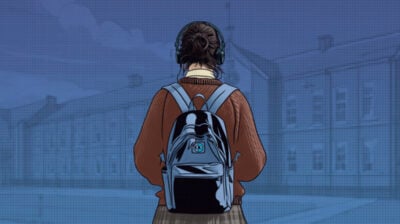The Leaving Cert English Paper
Helen shares her insights into prepping for this exam
Written by Helen Carroll
Voices - Advice
Young people share advice based on their experiences.

English is one of those odd papers to study for. There’s no “facts” like in biology and no sums to learn like in math. This means that there’s a good proportion of students who really struggle on just HOW to tackle this subject. I did quite well in English in my Leaving Cert, and I’ve been talking to a few who are doing their Leaving Cert this year. They seem to be most concerned about math and English. Unfortunately, I’ve always been terrible at maths and so can’t give any advice on it without seeming like a hypocrite but English was thankfully another story.
There’s a few elements of the English paper which are unique to it, and hopefully I’ll be able to show you guys how I studied for it and what seems to work for students.
The poetry section
If you’re in higher level, you’ve got to learn those poems off. But learning 6 poems from 5 different poets is 30 poems, and that’s insane. I would definitely recommend you study six poems from each poet, and do five poets so you are guaranteed at least one will turn up. How do you learn the full poem?
Well… you don’t. There’s no need to be able to cite off the entire poem, so get a sheet of paper and divide the page in half down the middle, putting the most important lines of the poem on one side, and the metaphors, emotions and possible double meanings etc. of those lines on the other side. Try to pick poems with a similar theme to each other eg: one on family conflict, then one on war, which is international conflict. You’ll end up with a double-sided sheet for each poet that shows you the ideas and messages the poets are trying to get across. This is now your Bible, and you should read your Bible every night before bed. It’ll drill it into your head without you even putting in much effort.
Also, my class noticed a general trend in the papers when I was doing my Leaving Cert. Almost every year, there was at least one female poet, one Irish one and one foreign poet. Sometimes the only foreign poet was female, so that satisfied two categories. This is playing strategy a bit, but I would suggest ensuring that you study every poet from one of these categories eg: study all the women. Ensure you’re doing five poets anyways, because you don’t want to be caught out! It DOES happen, and happened to a few friends of mine who thought they were getting ahead of the system by working out some “formula” that didn’t exist. Theories are theories, so the guesses people make can be wrong.
Improve your vocabulary
The obvious way to improve your vocab is reading books, but at this point in the year, I doubt you’ve much time to be doing that. There’s a couple ways to improve your spelling and grammar in the few months left until the Leaving, don’t worry.
My number one suggestion is disabling autocorrect on your phone. You can easily google how to do it. By having it on your phone, you get lazy with spelling because you know it’ll correct what you have to say, and you end up forgetting apostrophes and full stops. You don’t think when you type, and that’s when things start to slip. Disable predictive text too, if you can, because it limits the range of words you use.
When you find yourself struggling to think of a word to convey what you’re feeling, google it. Look up synonyms and antonyms of what you’re trying to think of, because it gives you different ideas and ways to express yourself, which looks fantastic on a paper. If you only know how to describe something as “cool”, “nice” or “awesome”, you’ll be throwing away easy marks.
Also, stop using words like “gotta” and “hella”. It won’t impress an examiner. It’s incorrect English. If you’re writing a story and a character speaks using slang, that’s obviously different, but don’t put it in an essay otherwise.
Timing and avoiding the dreaded hand cramp
It’s obvious you need to learn how to time yourself for the exam, but you need to work out what timing should be like for YOU. Maybe you need 15 full minutes to choose your questions at the start of the paper, or maybe you’re like I was and are able to choose within five minutes? We’re all different, and you need to work out what suits you. Timing yourself when you do homework and practice questions is a good idea, and be sure to give yourself between five and twenty minutes at the end of the exam to check back over for spelling and grammar. Anything outside that range is either too much time or too little, but it all depends on your own preference.
Another odd one that people complain about often, but never really talk about solving, is when your hand starts to cramp. English is a LOT of writing, as are a few other subjects like history or geography. Be sure to hold your pen firmly, but loosely. Don’t hold it in a death grip, and be sure to relax and wiggle your fingers every few minutes. Muscle cramp occurs when not enough oxygen is getting to the muscles, and when this happens it becomes very difficult to continue writing. Prevention is way better than cure, so making sure this doesn’t happen in the first place will ensure you can keep writing for the whole length of the exam.
Engage with the teacher
It’s been proven time and time again that if you genuinely enjoy a subject, you’ll do better in it. You study more and the study seems less like a chore. If you’re not the biggest fan of English, you should be. Not only is it on your Leaving Cert, it’s actually an awesome subject. Ask more questions in class, hype yourself up for the classes and really try with your homework. English is creative and there’s no wrong answer, provided you can back up a claim. Have fun with the subject. By seeing it as an opportunity to do something different to the rigid subjects like physics or chemistry, you’ll see it in a new light.
Another last point to make is that you should look up reviews for the books/plays/films you’re doing for your comparative. Try to find ones written by those with experience in the subject, not just some online article about “how epic” the movie was. Try find pieces that are similar to the ones you’re studying, or ones that were inspired by it. For example, I studied the movie Blade Runner, which was based on the Philip K. Dick book “Do Androids Dream of Electric Sheep?”.
By looking more into this, I saw it was one of the most popular dystopian books of all time. Fahrenheit 451 also focused on the same idea of a city crumbling apart, albeit under different circumstances. Dystopia is a sub-genre of science fiction, the opposite of utopia. There are books with what seems like a utopia and a dystopia in them at the same time, like H.G Wells’ “The Time Machine”, and so on. By seeing the jumps between different texts, you are able to back up your points more easily and you sound more scholarly (read= better grades).






